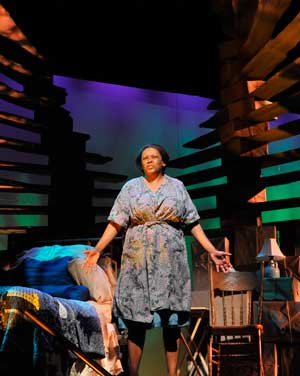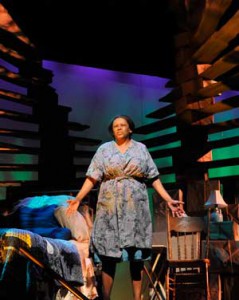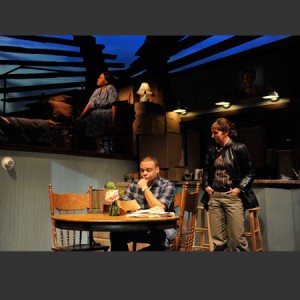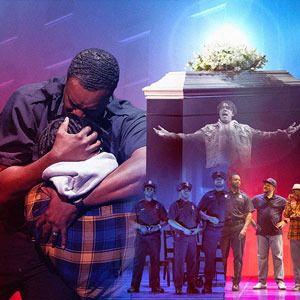
 highly recommended While the world we live in has become much more tolerant in racial matters, we are still not near perfection. Many of us recall the days when Blacks and Whites lived in their own areas, even here in the Midwest, but in the South it was as if the slaves, even after theirfreedom, were not free. If back in the mid 1900’s a Black woman would want to be with a White man or vice-versa, people would shun them, even their own families! Today, we somewhat more tolerant, but the divide has become more than Black and White and many different shades of Brown and Tan have been added into the mix. Who are we, but the growth of our roots, which have been determined by those who bore us and raised us.
highly recommended While the world we live in has become much more tolerant in racial matters, we are still not near perfection. Many of us recall the days when Blacks and Whites lived in their own areas, even here in the Midwest, but in the South it was as if the slaves, even after theirfreedom, were not free. If back in the mid 1900’s a Black woman would want to be with a White man or vice-versa, people would shun them, even their own families! Today, we somewhat more tolerant, but the divide has become more than Black and White and many different shades of Brown and Tan have been added into the mix. Who are we, but the growth of our roots, which have been determined by those who bore us and raised us.
In “Tree”, a powerful Chicago premiere, written by Julie He’bert , who was raised in the South, we have a 90 minute view into the lives for a family that was caught in the treadmill of the times. Jessalyn Price ( a dynamic performance by Celeste Williams) is an aging woman, living in her home in Chicago with her divorced son Leo ( deftly handled by Aaron Todd Douglas), a chef ( or cook, depending on if you are in the kitchen or at the counter). Jessalyn spends a great deal of time in her room, ailing and confused, and waiting for death to welcome her to the next level.Leo leaves for work, his daughter JJ ( the adorable Leslie Ann Sheppard) comes by to keep an eye on her Grandma. This is how they live, probably day after day after day, until one day a visitor shows up.
Didi Marcantel ( the always reliable Elaine Rivkin) a professor of gender studies, arrives at the door of their home wanting to meet Leo and his mother and ask them questions. In the beginning, Leo backs off, but then gives her just a little bit of time. Didi explains that her father had recently passed away and she was there to clear up some confusion as to how her father,Ray, from Louisiana, was connected to this family in Chicago. There are some wonderful letters that her dad had left behind, true love letters that seemed to have come from one Jessalyn Price and she wanted to verify and clarify that she was in the correct place withthe right people. What we learn from the beautiful letters and their sentiment and the ramblings of a dying woman up in her room that interlace is that there is a connection and as the story foes on it becomes more contrived, but based on the when and where, we can believe it to very close to the truth. There are some little
What takes place is that these two worlds we have been presented collide and He’bert’s masterful storytelling and marvelous direction by Andrea J. Dymond, allows us to feel that we can go back in time and watch some of the past events take place Although we never see Ray, at times, we can feel his presence, as if he is standing over his children. Yes, there are shared roots and together they stich together a beautiful love story that was unthinkable and yet, despite it all left its mark on Earth. Despite the differences of race, culture and gender, Didi and Leo, must accept the truths that have been discovered and face knowing where they came from and why. How can one really go forward in their life without any history of how they got to be where they are today. Dymond and He’bert do a marvelous job of creating the mystique and the imagery that allows the audience to focus in on the words and the actions on the stage at Victory Gardens.
To complet a picture as strongly as Dymond does, it takes a group of people who are often ignored or just mentioned in a review- these are the people who create all of the other ingredients in the recipe for a production o fthis strength. A marvelous set ( Jaquelineand Rick Penrod) where we can see the layers of the house and the symbolism of the little fishing boat filled with letters that becomes the refuge for DiDi and Charlie Cooper’s perfct lighting effects creating the moods of each of the well written scenes by He’bert. Judith Lundberg’s costumes are nothing fancy, but are quite fitting for the characters and Misha Fiskel, as always, makes certain that not a word is lost. Grant Sabin is the designer of the props and there are a great number of them, not just the thousands of letters, and bottles of beer and eggs and plates and flowers and the list goes on. This is a task that is very detail orientated- just think, one missing piece could be very integral to a scene- what if? One never has to worry about that with Sabin!
All the ingredients are in place and have been blended to perfection by this crew under the onstage leadership of stage manager Michelle Medvin, so that we the audience can leave the theater well satisfied that we have seen a unique an dtenderlove story between a man and a woman and then a rebirthfor another man and woman ( a different type of “love”), and if you feel like you want more, stay for the dessert, if you come on a Wednesday for the post show discussion). “TREE” will continue at Victory Gardens Theater through May 1st with performances as follows:
Tuesdays ( April 26th) 7:30 p.m.,Wednesday at7:30 p.m. and a matinee at 2 p.m. on April 20th,Thursday, April 21 and Fridays at 7: 30 p.m.,Saturdays at 4 and 7:30 p.m. and Sundays at 3 p.m.
Tickets range from $20-$50 and can be purchased at the box office of Victory Gardens located at 2433 N. Lincoln Avenue( with plenty of dining, valet parking and discounted at Children’s Memorial and easy to reach by public transportation), by phone at 773-871-3000 or online at www.victorygardens.org ( where you can also check out the special events for selected performances)







More Stories
“Blue” reviewed by Jacob Davis
“The Secret Garden”
“Yippee Ki Yay” The Parody of Die Hard reviewed by Frank Meccia